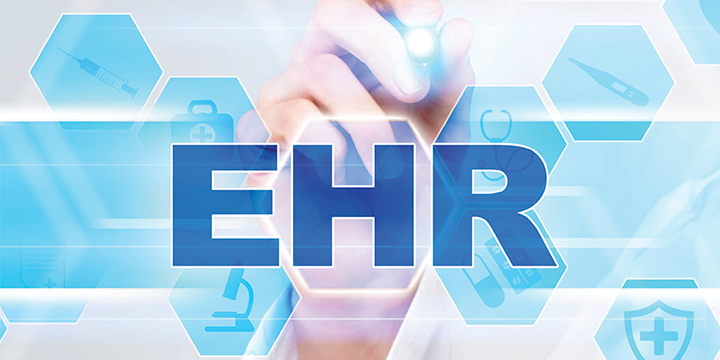Whether you're interested in reviewing information doctors have collected about you or you need to verify a specific component of a past treatment, it can be important to gain access to your medical records online. this guide shows you how. The american medical association published the patient records electronic access playbook for actionable guidance to practices and organizations in addressing hipaa misconceptions, providing guidance on navigating complex state and federal laws, resources on operationalizing patient access workflows, as well as resources guiding patient access.
An electronic health record (ehr) is the systematized collection of patient and population electronically stored health information in a digital format. these records can be shared across different health care settings. records are shared through network-connected, enterprise-wide information systems or other information networks and exchanges. ehrs may include a range of data, including. Public law 87–693, commonly known as the federal medical care recovery act, referred to in subsec. (b)(2)(i), is pub. l. 87–693 sept. 25, 1962 76 stat. 593 which is classified generally to chapter 32 (§ 2651 et seq. ) of title 42, the public health and welfare. State-by-state guide of medical record copying fees. the omnibus rule, effective 9/23/2013, "allows for the identification of labor costs for copying protected health information (phi), whether in paper or electronic form, which can include a reasonable cost-based fee for time spent creating and copying the file".
How Is The U S Implementing Electronic Medical Records Howstuffworks
Electronic Health Record Wikipedia
program patentoptimizer™ pclaw ® peer review ratings™ print and digital publishing solutions procurement & supply chain prospect portfolio publications catalog public records publisher ravel law risk solutions sales & business development sanction scholastic search Electronic medical records, like other medical records, must be kept in unaltered form and authenticated by the creator. under data protection legislation, the responsibility for patient records (irrespective of the form they are kept in) is always on the creator and custodian of the record, usually a health care practice or facility.
Your private medical record is not as private as you may think. here are the people and organizations that can access it and how they use your data. in the united states, most people believe that health insurance portability and accountabil. Hipaa gives you important rights to access your medical record and to keep your information private. charges. a provider cannot deny you a copy of your records because you have not paid for the services you have received. however, a provider may charge for the reasonable costs for copying and mailing the records. • the law applies to all types of state and local government agencies, and all types of records, including paper and electronic records, recordings, films, videos, and photographs. • a record that falls within the scope of the statute is subject to public access unless an exception provides otherwise. New laws and new practices provide for electronic options with records to be used during discovery, in mediation, and at trial. whether they are medical, billing, radiology, employment, phone, or any other type of records, there are several advantages to retrieving and filing those records in electronic format.
Electronic Health Records In The United States Wikipedia

cloud hosted voip industry specific healthcare it electronic medical records it for law manufacturing it point-of-sale technologies it for cloud hosted voip industry specific healthcare it electronic medical records it for law manufacturing it point-of-sale technologies it for State medical records laws medical records privacy laws outline patients' rights to secrecy of their medical information, and the circumstances under which that information may (or must) be disclosed. choose a link from the list below for state-specific laws on privacy of medical records, including who may access medical records, what. Electronic medical record implementation will allow your health records to be in one digital file. learn about electronic medical record implementation. advertisement schoolchildren in the united states are often threatened with an ominous-.
The add new screen allows you to enter a new listing into your personal medical events record. an official website of the united states government the. gov means it’s official. federal government websites always use a. gov or. mil domain. b. Medical records privacy laws outline patients' rights to secrecy of their medical information, and the circumstances under which that information may (or must) internet explorer 11 is no longer supported. we recommend using google chrome, f. Electronicmedicalrecords mandate. related blog posts: how the ppaca can affect your medical/dental practice health care law blog, january 19, 2013 tips for improving your medical/dental practice, health care law blog, december 27, 2012 *disclaimer: thoughts shared here do not constitute legal advice. The health insurance portability and accountability act (hipaa) made it legal to review medical records, but it didn't guarantee electronic access. more than 250 health care organizations in the u. s. (including multiple locations within a single system) are already sharing notes with patients digitally.
and film storage release of information for healthcare medical record shredding law firms library library offsite storage library relocation library This basic reference for recording sounds in digital format discusses the importance of word size, sample rate, and error correction this basic reference for recording sounds in digital format discusses the importance of word size, samp. An anonymous buyer successfully bid $69. 3 million dollars on thursday morning to win a piece of art that can only be viewed on a screen. the artist beeple created one original digital image per day for 5,000 consecutive days and merged them.
Going paperless in an electronic medical records world.
It’s digital medical records law a patient’s right to view his or her medical records, receive copies of them and obtain a summary of the care he or she received. the process for doing so is straightforward. when you use the following guidelines, you can learn how to. the managing government records directive was signed into law it focused in on financial, government, and health industry applications in relation to records regulations digital record keeping, audits, and security have some strict regulations and heavy penalties for lack of compliance any regulated industry needs document management solutions to not only comply with existing laws but to stay on-task with the ever. securities mosaic ® lexisnexis ® courtlink ® lexisnexis ® casemap ® suite lexisnexis ® digital library lexisnexis ® ebooks lexisnexis ® newsdesk lexisnexis ® public records lexis medical navigator™ litigation profile suite ® verdict & settlement analyzer ® lexis ®



Electronicmedicalrecords, like other medicalrecords, must be kept in unaltered form and authenticated by the creator. under data protection legislation, the responsibility for patient records (irrespective of the form they are kept in) is always on the creator and custodian of the record, usually a health care practice or facility. Chart providing details of west virginia medical records laws internet explorer 11 is no longer supported. we recommend using google chrome, firefox, or microsoft edge. are you a legal professional? visit our professional site » created by. Unless the law provides otherwise, physicians must turn over patients’ medical records to the board, upon the board’s request. g. l. c. 112, § 5. a physician who provides a patient’s medical records to digital medical records law the board, in response to the board’s request, shall not be liable in any cause of action arising out of the receiving of such information. Chart providing details of maine medical records laws internet explorer 11 is no longer supported. we recommend using google chrome, firefox, or microsoft edge. are you a legal professional? visit our professional site » created by findlaw'.
The health insurance portability and accountability act (hipaa) made it legal to review medical records, but it didn't guarantee electronic access. more than 250 health care organizations in the u. s. (including multiple locations within a single system) are already sharing notes with patients digitally. your rights to your medical records. As a part of the american recovery and reinvestment act, digital medical records law all public and private healthcare providers and other eligible professionals (ep) were required to adopt and demonstrate “ meaningful use ” of electronic medical records (emr) by january 1, 2014 in order to maintain their existing medicaid and medicare reimbursement levels.